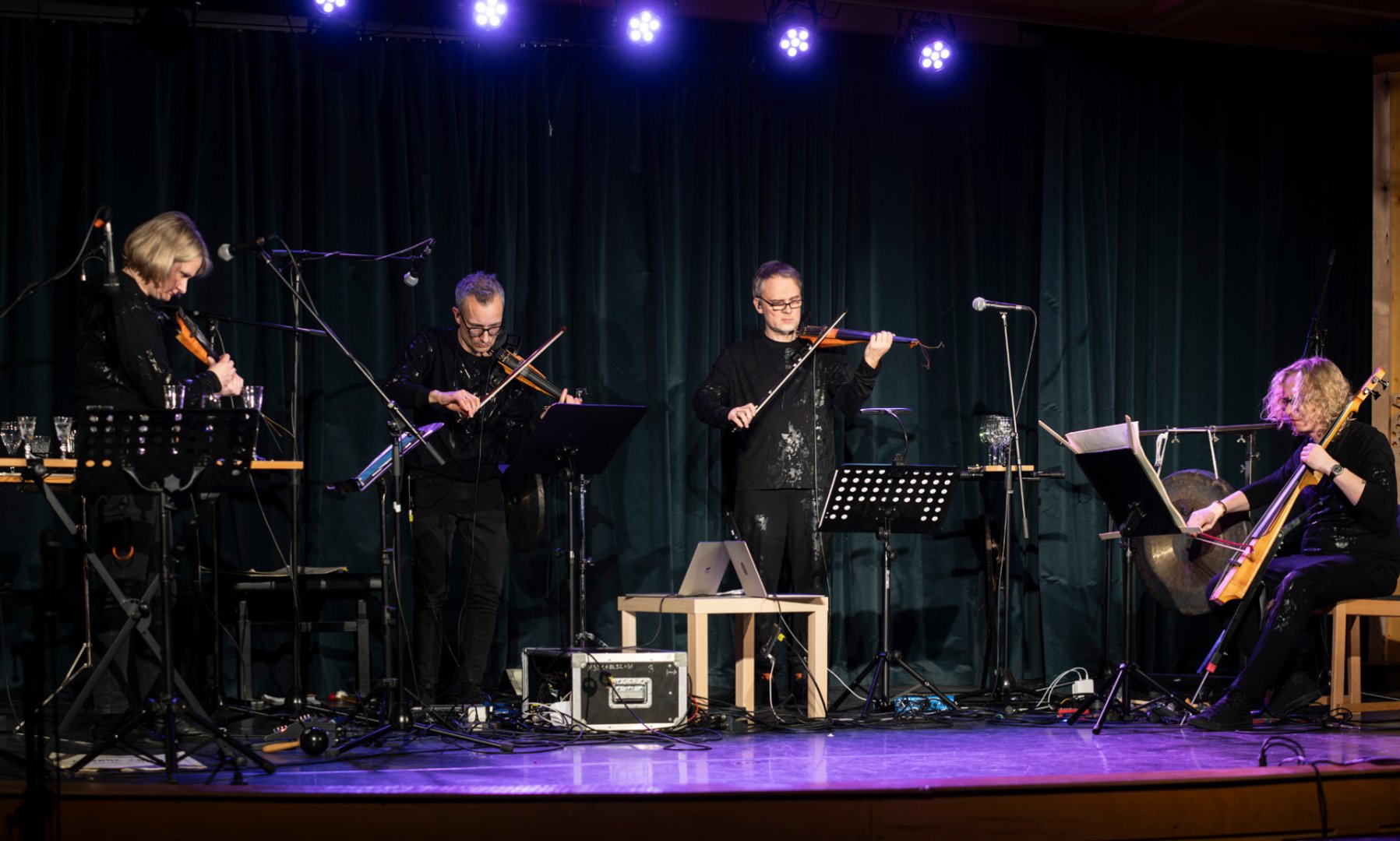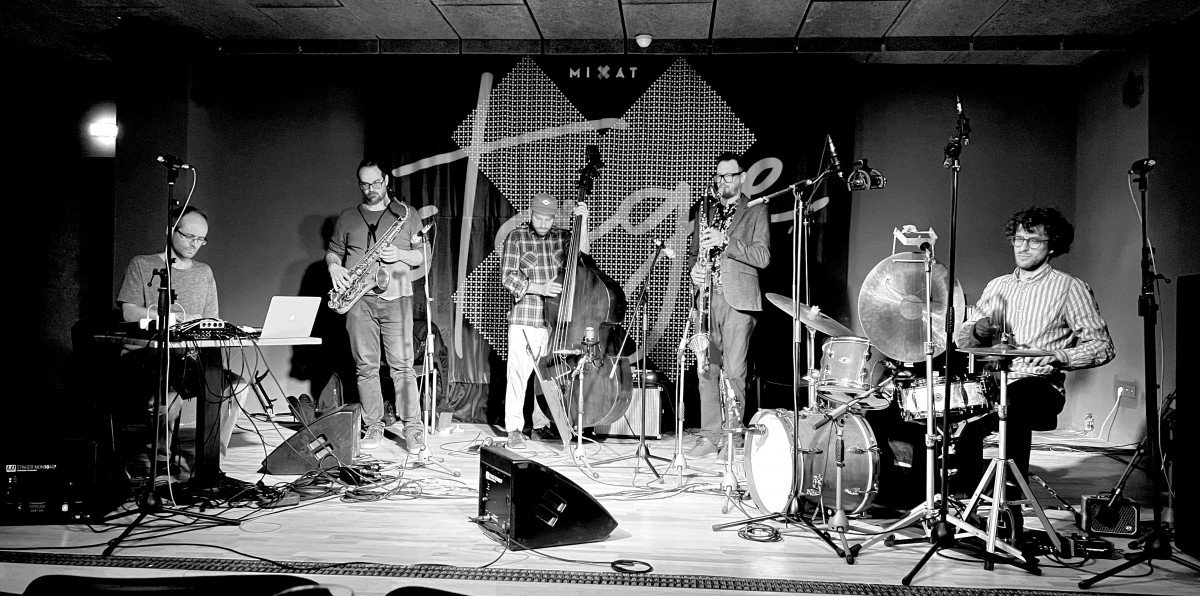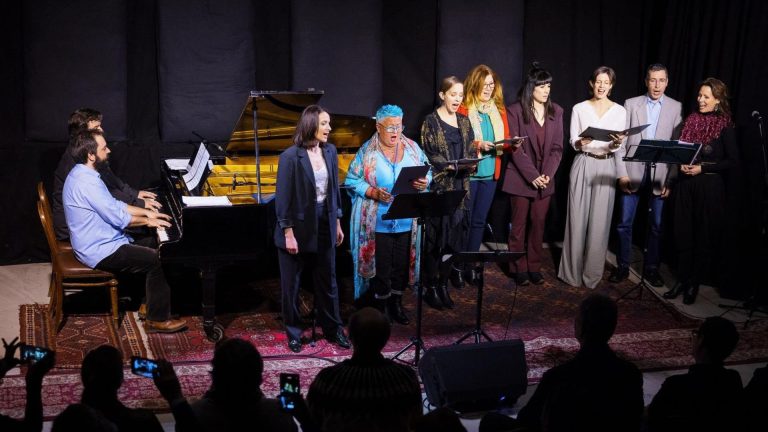Átlátszó Hang Újzenei Fesztivál (Transparent Sound New Music Festival), the Budapest organization specializing in performances of musical compositions that are daring, fresh, and rule-free, presented their 2024 marathon of concerts from January 6th through February 2nd in various venues in Buda and Pest.
Their series is one that I particularly look forward to as it dives headlong into adventurous programming. This year offered 22 events that featured works by living composers and a few that have recently passed on, such as George Crumb and Mátyás Sandai. In addition to the live performances, there was a book launch of Marcell Dargay’s “The 180 Ensemble,” and presentation of the new film “Once Within a Time” by Philip Glass and Godfrey Reggio. As the onstage host, composer Balázs Horváth spoke (and sang in one concert) to the audience in both Hungarian and English.
20th century Americana
On January 25th the audience at Három Holló witnessed an interesting experiment: offering, in a new way, songs by the innovative American composer Charles Ives to commemorate his 150th birthday and the 70th anniversary of his death. Assigning 21 intrinsically American songs to Hungarian singers produced some unexpected delights: the songs were originally written for men, but were instead sung by seven women soloists (and one man, Horváth).
Ives, a life insurance actuary and businessman by day and a composer by night, wrote a vast number of scores that we can label as true “Americana”– oddball pastiches of folk material, church hymns, military marches, wistful disembodied melodies, with a good sense of spoof thrown in. He was one of the first American composers to achieve international recognition.
Most of the women in this Ives showcase were not classical singers, but prominent folk and jazz singers; the result was more like musical theatre singing with quality acting. They sang in English (albeit some needed more coaching to get the accent right) and brought the songs to life with terrific charisma and humor. Marcell Dargay and Dániel Dinyés skillfully accompanied them on piano, and Horváth on obbligato melodica.

With the hideous sound of a thousand screaming witches flying around on broomsticks, George Crumb’s revolutionary score “Black Angels” blasts its righteous outrage in response to the horrors of the Vietnam War. Specifically dated on the score’s first page: “Friday the Thirteenth, March 1970 (in tempore belli)”, this piece for electrified string quartet received a stunning performance by the Gdańsk-based NEOQuartet, on January 28th at Fonó.
Crumb’s unorthodox narrative shunned any didactic tropes, and simply unfolded in 13 sections, forming an unbroken linear flow that included blips of references to Dies Irae, Medieval tropes, funereal chorales, the Devil’s Trill, and Schubert’s “Death and the Maiden.”
A 2004 newspaper interview with Crumb explained: “Th[is] music crystallized the composer’s uncanny ability to project ferocity and the beatific in the same voice. New music in 1970 was still dominated by emotionally constricted serialism, and Crumb’s direct sensuality had an explosive effect.” Crumb has also stated: “‘Black Angels — Thirteen Images from the Dark Land’ was conceived as a kind of parable on our troubled contemporary world … The image of the ‘black angel’ was a conventional device used by early painters to symbolize the fallen angel.”
According to the NEOQuartet, this performance was the Hungarian premiere of this piece on specifically electric instruments; all other performances, live or recorded, had been performed on acoustic instruments. In addition to their electric violins, viola, and cello, each player had a small side-table filled with noise-making objects like crystal glasses and hanging gongs. The final pensive moments of the 20-minute score were sounds of thin metal rods tapping on the quartet’s strings – suggesting fragile proof of the only existing viable matter left on earth.
My personal response to this monumental work is that it belongs in the pantheon of 20th century music that speaks to the dark side, along with Messiaen’s “Quartet for the End of Time,” Steve Reich’s “Different Trains,” Thomas Adès’ “Totentanz,” Stravinsky’s “The Rite of Spring,” the late works of Shostakovich, and Eötvös’ opera “Valuska.”

Átlátszó Hang concluded their series on February 2nd at Opus Jazz with the five-member experimental ensemble Quelquefois. Attending this concert reminded me of many evenings in Berlin ten years ago, when I would attend sessions of “free music” (improvised sounds without any particular structure) presented by small ensembles in unorthodox locations around the city. Those evenings gave me critical respite from stressors, but more importantly, relief from any predictable sound choices.
On this evening, Quelquefois also launched their latest vinyl album “Blooming.” The players are: single-reed players János Ávéd and Gergő Kováts, bassist Péter Ajtai, drummer Attila Gyáfas, and masterminding the electronics, Bálint Bolcsó. With intuitive mutual agreement, they swim into an ionospheric level of flow, creating spontaneous waves of expression. Their credo is “we believe that improvised music is the most communal form of contemporary music.”
The group’s fearless magic intrigued a young exchange student from Hong Kong, who sat next to me and asked: “I’ve never heard anything like this before. What should I do with it?” I answered: “You just jump into the flow.”











